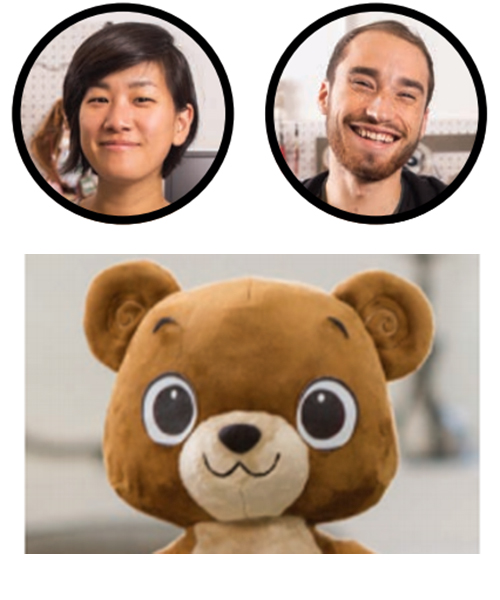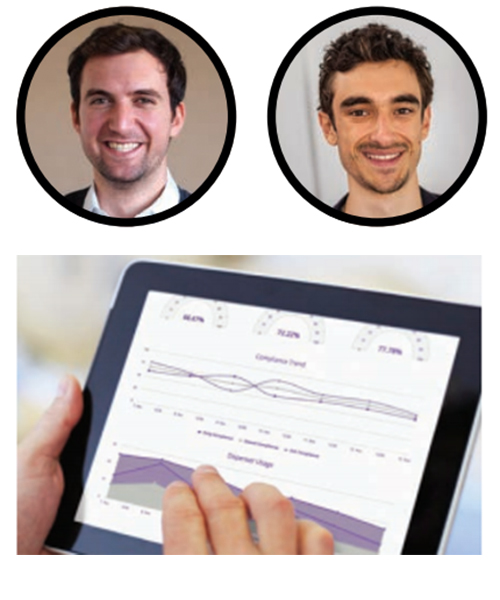Startups Grow Up: Success Stories From The Front
Post graduation, these Northwestern Engineering Alumni and their startups continue to make a positive impact in health, education, technology, and advertising.
Grounded in whole-brain thinking and applying the knowledge and skills they honed through interdisciplinary coursework, many Northwestern Engineering alumni-entrepreneurs have taken their student initiatives and innovations to new heights in the marketplace. Here’s what Northwestern Engineering learned when we reached out to four of these alumni-founded startups.
ADAPTLY
FOUNDED: 2010
The Business
 Adaptly offers a platform to help advertisers purchase and optimize ad campaigns across all social networks.
Adaptly offers a platform to help advertisers purchase and optimize ad campaigns across all social networks.
The Alumni
Nikhil Sethi (electrical engineering ’10), co-founder and chief executive officer; Garrett Ullom (former Northwestern Engineering student), chief technology officer
The Start
Sethi’s vision for took shape while he was a senior in NUvention: Web, a course offered by the Farley Center for Entrepreneurship and Innovation in which interdisciplinary student teams collaborate on developing and launching software-based companies.
Previously
Co-founder Sethi was named to the 2012 Forbes's "30 Under 30" list as “an innovator to watch” after Adaptly—just two years old at the time—had raised $13 million in investor funding and included on its client list the likes of PepsiCo, Kraft, and Arby’s.
The Latest
Adaptly continues to scale its presence globally while growing its social media partnerships. In 2016, the company announced its status as a Snapchat Partner, which enabled the integration of Snap Ads into Adaptly’s media buying campaigns. The company also released a case study documenting how its platform helped KFC reach 10 million consumers during the fast-food giant’s 2015 “Pack More into Lunch” ad campaign.
LUNA LIGHTS
FOUNDED: 2014
The Business
 Luna Lights, an automated lighting system, reduces the risk of falling by guiding older and other at-risk individuals in their homes at night. Users sleep on a pressure-sensing pad that employs radio frequencies to trigger a lighting system when the user gets out of bed.
Luna Lights, an automated lighting system, reduces the risk of falling by guiding older and other at-risk individuals in their homes at night. Users sleep on a pressure-sensing pad that employs radio frequencies to trigger a lighting system when the user gets out of bed.
The Alumni
Donovan Morrison (biomedical engineering ’14), co-founder and chief executive officer; Matthew Wilcox (mechanical engineering ’14), co-founder and chief technology officer; Wesley Youman (civil engineering ’15), former chief operating officer
The Start
In 2012, working through Design for America, the inter- disciplinary student initiative founded at Northwestern and focused on how human-centered design can positively impact communities, the Luna Lights team members partnered with The Mather, an Evanston-based retirement community, to explore ways to reduce falls among older adults.
Previously
Working with The Mather, Luna Lights wrapped an initial pilot program that tested the technology with the facility’s residents in the spring of 2015.
The Latest
Presbyterian Homes’ Lake Forest Place received the first installation of Luna Lights in September 2016. With $225,000 in new funding recently raised from several investment groups, including Impact Engine, Breakpoint Ventures, and Chicago ArchAngels, the team plans to expand the capabilities of the analytics platform that drives the lighting system, as well as ramp up manufacturing efforts to bring Luna Lights to senior living communities across the United States.
SPROUTEL
FOUNDED: 2012
The Business
 Tapping into the power of storytelling and play, Sproutel creates toys, games, and experiences to help children learn about their health. The company’s flagship product, Jerry the Bear, is an interactive stuffed animal that helps children manage type-1 diabetes.
Tapping into the power of storytelling and play, Sproutel creates toys, games, and experiences to help children learn about their health. The company’s flagship product, Jerry the Bear, is an interactive stuffed animal that helps children manage type-1 diabetes.
The Alumni
Hannah Chung (mechanical engineering ’12), co-founder and chief creative officer; Aaron Horowitz (combined studies ’12), co-founder and chief executive officer
The Start
Jerry the Bear was the first Design for America project started by Chung in 2009. Horowitz joined the team in 2010 and together they built the first prototype.
Previously
Co-founders Chung and Horowitz introduced President Barack Obama to Jerry the Bear as part of the 2015 White House Demo Day, an event recognizing startup companies founded by women and/or underrepresented minorities.
The Latest
Sproutel recently received a utility patent on the core technology powering Jerry the Bear, which is now at work in 25 percent of pediatric endocrinologist offices across the country. The company is also making strides to secure corporate partnerships to strengthen connections between play and health among a broader audience, with plans to launch new products that will assist children suffering from cystic fibrosis and battling obesity.
SWIPESENSE
FOUNDED: 2012
The Business

SwipeSense connects hospital operations to the Internet. The company’s first application is a hand hygiene improvement tool that reduces the number of hospital-acquired infections and helps avoid costly penalties.
The Alumni
Mert Iseri (combined studies ’11), co-founder and chief executive officer; Yuri Malina (integrated science ’11, Weinberg College of Arts and Sciences), co-founder and chief product officer
The Start
NorthShore University HealthSystem’s Evanston Hospital, a Design for America client, approached Iseri and Malina in 2009 to help improve hand-hygiene practices among doctors, nurses, and staff. After learning about the countless hours hospital personnel spent measuring hand hygiene, the duo designed a simple, sleek device that leverages technology to record hand sanitizer usage information and promotes good habits.
Previously
Following the company’s top-three finish in The Wall Street Journal’s “WSJ Startup of the Year” competition in 2013, Iseri and Malina were named to Forbes’ 2015 class of “30 Under 30 Social Entrepreneurs.”
The Latest
SwipeSense received $4 million in new venture capital in July 2016, bringing its funding total to $16.9 million. The company continues to scale its product’s national presence with notable results; one customer reported a 70 percent drop in hospital- acquired infections. SwipeSense has continued to expand its team to include nearly a dozen new engineers, technicians, and project managers. It was also named a finalist for the “Industry Disrupter Award” by the Illinois Technology Association’s 17th Annual CityLIGHTS Awards.
